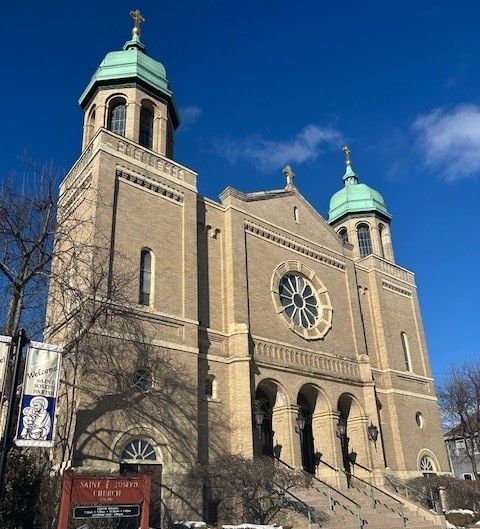Penance
Confession Schedule
Saturday 11:00 - 12:00 noon
3:00 - 3:45 pm
The Sacrament of Penance and Its Parts
The follower of Christ who has sinned buy who has been moved by the Holy Spirit to come to the sacrament of penance should above all be converted to God with his whole heart. This inner conversion of heart embraces sorrow for sin and the intent to lead a new life. It is expressed through confession made to the Church, due satisfaction, and amendment of life. God grants pardon for sin through the Church, which works by the ministry of priests.
a. Contrition
The most important act of the penitent is contrition, which is "heartfelt sorrow and aversion for the sin committed along with the intention of sinning no more." "We can only approach the Kingdom of Christ by metanoia. This is a profound change of the whole person by which one begins to consider, judge, and arrange his life according to the holiness and love of God, made manifest in his Son in the last days and given to us in abundance" (see Hebrews 1:2; Colossians 1:19 and passim). The genuineness of penance depends on his heartfelt contrition. For conversion should affect a person from within so that it may progressively enlighten him and render him continually more like Christ.
b. Confession
The sacrament of penance includes the confession of sins, which comes from true knowledge of self before God and from contrition for those sins. However, this inner examination of heart and the exterior accusation should be made in the light of Gods' mercy. Confession requires in the penitent the will to open his heart to the minister of God, and in the minister a spiritual judgment by which, acting in the person of Christ, he pronounces his decision of forgiveness or retention of sins in accord with the power of the keys.
c. Act of Penance (Satisfaction)
True conversion is completed by acts of penance or satisfaction for the sins committed, b amendment of conduct, and also by the reparation of injury. The kind and extent of the satisfaction should be suited to the personal condition of each penitent so that each one may restore the order which he disturbed and through the corresponding remedy be cured of the sickness from which he suffered. Therefore, it is necessary that the act of penance really be a remedy for sin and a help to renewal of life. Thus the penitent, "forgetting the things which are behind him" (Philippians 3:13), again becomes part of the mystery of salvation and turns himself toward the future.
d. Absolution
Through the sign of absolution God grants pardon to the sinner who in sacramental confession manifests his change of heart to the Church's minister, and thus the sacrament of penance is completed. In Gods design the humanity and loving kindness of our Savior have visibly appeared to us, and God uses visible signs to give salvation and to renew the broken covenant.
In the sacrament of penance, the Father receives the repentant son who comes back to him, Chris places the lost sheep on his shoulders and brings it back to the sheepfold, and the Holy Spirit sanctifies this temple of God again or lives more fully within it. This is finally expressed in a renewed and more fervent sharing of the Lord's table, and there is great joy at the banquet of God's Church over the son who has returned from afar.
The Sacrament of Penance and Its Parts
Just as the wound of sin is varied and multiple in the life of individuals and of the community, so too the healing which penance provides is varied. Those who by grave sin have withdrawn from the communion of love with God are called back in the sacrament of penance to the life they have lost. And those who through daily weakness fall into venial sins draw strength from a repeated celebration of penance to gain the full freedom of the children of God.
a. To obtain the saving remedy of the sacrament of penance, according to the plan of our merciful God, the faithful must confess to a priest each and every grave sin which they remember upon examination of their conscience.
b. Moreover, frequent and careful celebration of this sacrament is also very useful as a remedy for venial sins. This is not a mere ritual repletion or psychological exercise, but a serious striving to prefect the grace of baptism so that, as we bear in our body the death of Jesus Christ, his life may be seen in us ever more clearly. In confession of this kind, penitents who accuse themselves of venial faults should try to conform more closely to Christ and to follow the voice of the Spirit more attentively.
In order that this sacrament of healing may truly achieve its purpose among Christ's faithful, it must take root in their whole lives and move them to more fervent service of God and neighbor.
The celebration of this sacrament is thus always an act in which the Church proclaims its faith, gives thanks to God for the freedom with which Christ has made us free, and offers its life as a spiritual sacrifice in praise of God's glory, as it hastens to meet the Lord Jesus.
Act of Contrition
O my Savior, I am truly sorry for having offended you because you are infinitely good and sin displeases you. I detest all of the sins of my life and I desire to atone for them. Through the merits of your Precious Blood, wash from my soul all strain of sin, so that, cleansed in body and soul, I may worthily approach the Most Holy Sacrament of the Altar.
This is the Sacrament in which sins committed after Baptism are forgiven. It results in reconciliation with God and the Church. (US Catholic Catechism for Adults, Glossary)

